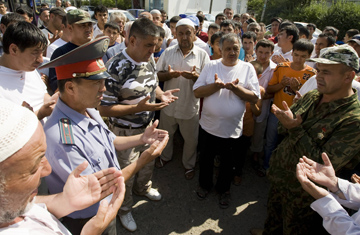
Kyrgyz police officers (2nd and 3rd left) pray with residents of Uzbek district of the city of Osh June 29, 2010. Outright violence may have stopped for now, but tension is still simmering
The Talipov family were among the lucky ones. For four days straight in mid-June, Kyrgyz mobs attacked the Uzbek community in the city of Osh, looting and burning entire Uzbek neighborhoods. Hundreds of people were murdered, but the Talipovs lost only one of their own: a second cousin was shot in the stomach by a gang of men near his home and bled to death in hospital the same night. Before sunrise, the family had buried him. Then they allowed themselves to believe in the calm that was returning to the city. In the weeks that followed, the hundreds of thousands of Uzbeks who had escaped to refugee camps slowly came home. The violence appeared to have passed.
Then at 5:45 on the morning of July 8, four police cars pulled up to the Talipovs' home and 20 men in uniforms piled out, some wearing masks, all carrying Kalashnikovs. They barged in, fired a warning shot into the ceiling, and ransacked the house. Somewhere in the kitchen they found 11 bullets, which the Talipovs say were planted, and arrested the four men in the house. Throughout the rest of that day, at the Interregional Directorate, a feared police bureau known as the MRU, all of the men were brutally beaten. "They wanted me to confess to murder and rape during the June events, but I showed them documents proving that I was in Bishkek at the time of the riots," says Babur Talipov, 28. By morning, the Talipov men had made a deal to secure their release in exchange for $1,500. Three of them walked free. But the eldest brother, Alisher, remains in an isolation cell. He has agreed, his relatives say, to falsely confess to the murder of Kyrgyz.
As borne out in hundreds of similar stories over the past six weeks, the tragedy suffered by the Uzbeks in southern Kyrgyzstan is far from over. It has simply shifted from the open slaughter seen last month to a quiet, systematic campaign of torture and incrimination, with the Uzbeks being blamed for the violence that was inflicted upon them. In a July 20 statement, the U.N. High Commissioner for Human Rights, Navi Pillay, said that large numbers of men in southern Kyrgyzstan, virtually all of them Uzbek, were being arbitrarily arrested, beaten and tortured for false confessions related to the June riots. Their fingernails were being pulled out and cigarettes extinguished on their skin, and they were being forced to pay large sums of money to secure their release, the U.N. said. The detentions, Pillay added, "not only demonstrate flagrant ethnic bias, but also break many of the fundamental tenets of both Kyrgyz and international law."
On the second floor of the MRU headquarters is the spartan office of Col. Rakhmatullo Akhmedov, one of the officers in charge of the investigation into the June events. He admits that incidents of abuse may have taken place amid the hunt for the perpetrators of the violence. "We will look into every complaint that is filed through the official channels," Akhmedov said in a July 4 interview. "But every country lives by its own rules, and ours are fundamentally different from many of those in Europe and the United States."
(In a follow-up phone interview, TIME asked Akhmedov about the U.N. statement as well as the details of the Talipov case, including claims of an illegal search, planted evidence, forced confessions and the acceptance of bribes. "These claims will be investigated individually within the framework of Kyrgyz law," he said, declining to comment further.)
Outside Akhmedov's window, in front of the MRU's jail across the street, a crowd of women gathers on most days to deliver bundles of food, clothing and medicine to their relatives inside. They whispered to each other in Uzbek and wore long traditional Uzbek dresses. But Akhmedov will not engage in a discussion of the ethnic nature of the June violence or the fact that mainly Uzbeks are being arrested. "The investigators must remain blind to ethnic divisions. We adhere only to the objective facts," he says with a sigh, and then offers an analogy: "Just look at the Holocaust in Europe. Many have reached the conclusion that this was an ethnic conflict ... But there are millions of people who will present you with millions of pieces of evidence that it was not. The debate can go in circles forever."
